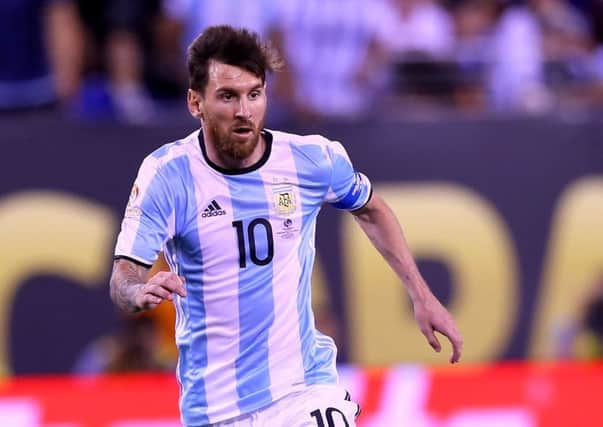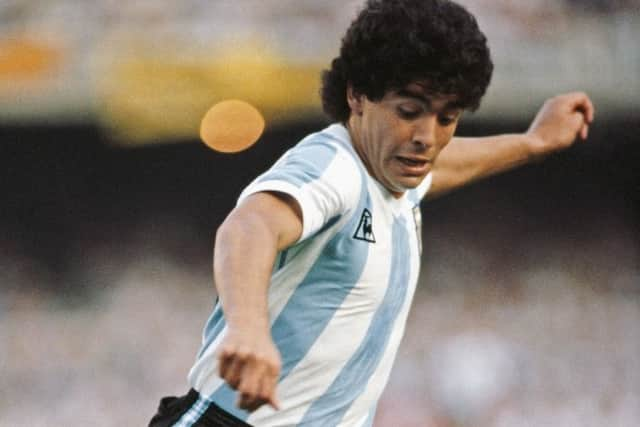Alan Pattullo: Messi still playing in Maradona's shadow


Messi might never win prizes for wit or wisdom, just as he might never convince everyone he’s a better player than Diego Armando Maradona, or a more compelling character. Yet they seem forever linked.
The very last word in Touched by God, Maradona’s recently published memoir about winning the World Cup with Argentina in 1986, is actually “Messi”, which is strange given the subject matter. But then 1986, and specifically what happened that summer, is often cited in those arguments detailing why Messi cannot be reckoned to have emulated, never mind exceeded, his compatriot’s greatness.
Advertisement
Hide AdAdvertisement
Hide AdMaradona was just 25 years old when he carried the burden of a nation’s hopes on his shoulders in Mexico. As he himself writes, he remains “one of the few Argentines who knows how much the World Cup weighs” having led the team to a second title with a win over West Germany. A year later almost to the day, in an industrial port town called Rosario, 300 kilometres north west of Buenos Aires, something potentially as precious arrived.


This bundle of joy turns 30 on Saturday.
Messi remains Argentina’s great hope of winning another World Cup anytime soon. But time, together with opportunities, is running out.
Now heavily bearded, and having taken a battering from defenders twice a week in La Liga for well over a decade, some might contend Messi looks every day his age.
But it’s what he hasn’t yet done in a career studded with personal and team glory that could yet define him, remarkably. What do you give the man with everything, including five Ballon d’Ors? A World Cup seems the obvious answer.


To be fair, Maradona doesn’t linger over Messi’s supposedly vital missing qualification in his new book, published, somewhat eccentrically, 31 years after Argentina’s memorable victory.
Despite not being someone known for giving the benefit of the doubt to people – Michel Platini is called a “French turkey” by Maradona, World Cup-winning manager Carlos Bilardo a “jerk” – he has long been a supporter of Messi, who he hoped would inspire Argentina to glory in South Africa in 2010.
Maradona had specific reason to wish for this since he was manager at the time, and took the heat for the team’s failure. Bilardo, then national team director, is identified as the “betrayer” wanting him out.
But Maradona doesn’t blame Messi, described as his best player along with Javier Mascherano, for their early exit, just as he doesn’t reckon the Barcelona player let anyone down four years later in Brazil.
Advertisement
Hide AdAdvertisement
Hide AdA tired Argentina lost out to Germany in the final at the Maracana, where a win would surely have given Maradona’s gilded story of ’86 a run for its money.
But he does include a chapter subheading that poses – and answers – the question: “Maradona or Messi? Maradona AND Messi!” Both were glorious players who wore the No 10 shirt, he declares – Maradona was never one for self-effacement, and why should he deny what was plain to see?
Maradona doesn’t believe it will make any difference to Messi’s current best player in the world status whether he helps Argentina win the World Cup next summer or not (he does have a considerably better chance of doing so since rescinding his retirement last year).
But Maradona does propose a way he and Messi can be separated. It’s not for what he did in the shirt of the national team. Rather, it’s for what he achieved for a previously unfashionable club in southern Italy.
It’s odd that Maradona didn’t insist on publishing a book celebrating the 30th anniversary of his first scudetto with Napoli, which was also the first time a team from southern mainland Italy had won the Italian title.
This 1987 success is arguably the greater story.
“I had to put together my own team, whereas Lio joined a powerhouse at Barcelona,” he writes. “Now, that’s not his fault, just the opposite: he joined that team (Barcelona) and makes a difference there.”
But Maradona questions whether Messi could have done what he did in Naples. He lacks, for one thing, Maradona’s power of personality, as well as the twist of villainy required to survive in such a lawless city for so long.
Maradona stayed a surprising seven seasons, leading Napoli to another league title in 1990, as well as the Uefa Cup and a Coppa Italia. Napoli have won only two Coppa Italias since.
Advertisement
Hide AdAdvertisement
Hide AdMessi could well be Argentina’s inspiration next year in Russia, where his rival for the crown of best footballer in the world, Ronaldo, is currently tearing it up.
But unless Barcelona fall on some hard times pretty quickly, Messi won’t ever match what Maradona did in Naples 30 seasons ago – back when he was still learning how to kick in his mother’s womb.
l Touched by the Hand of God – How We Won the Mexico ’86 World Cup by Diego Maradona with Daniel Arcucci [Constable, £20].